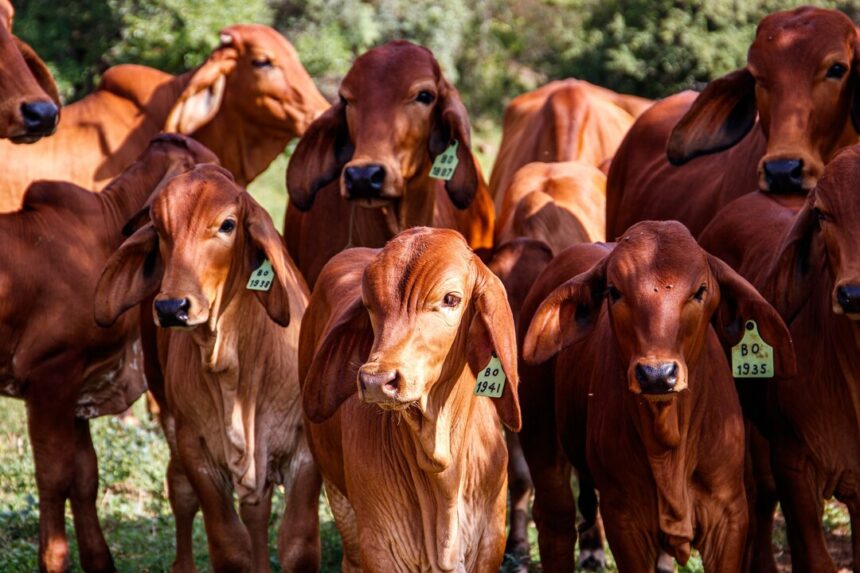Brahman cattle, with their distinctive appearance and robust characteristics, have become an integral part of South Africa’s livestock industry. As one of the leading cattle breeds in the country, Brahman cattle are prized for their adaptability, resilience, and superior meat quality. Whether you’re a seasoned breeder or considering entering the world of Brahman farming, here are ten key insights that you should know about breeding and farming Brahman cattle in South Africa.
- Adaptability to South African Conditions:
Brahman cattle are renowned for their adaptability to various climates and environmental conditions, making them well-suited to South Africa’s diverse landscapes. Whether in the hot and arid regions of the Northern Cape or the humid coastal areas of KwaZulu-Natal, Brahman cattle thrive in a range of environments. - Heat Tolerance:
One of the most notable characteristics of Brahman cattle is their exceptional heat tolerance. Originating from the tropical regions of India, Brahman cattle have developed natural mechanisms to cope with high temperatures, making them ideally suited to South Africa’s warm climate. - Disease Resistance:
Brahman cattle exhibit a high level of disease resistance, particularly against common livestock ailments such as ticks, parasites, and heat stress-related illnesses. This innate resilience reduces the need for extensive veterinary interventions and minimizes production losses. - Superior Meat Quality:
Brahman cattle are prized for their superior meat quality, characterized by tenderness, juiciness, and flavor. The breed’s unique genetic makeup, including its ability to marble fat within the muscle tissue, contributes to the exceptional eating experience of Brahman beef. - Reproductive Efficiency:
Brahman cattle are known for their reproductive efficiency, with cows exhibiting high fertility rates and excellent maternal instincts. This makes Brahman cattle an attractive option for commercial breeders seeking to maximize productivity and herd expansion. - Genetic Diversity:
South Africa boasts a diverse population of Brahman cattle, with breeders actively working to improve the breed through selective breeding and genetic selection. This genetic diversity allows farmers to choose animals that best suit their specific production goals and environmental conditions. - Grazing and Foraging Abilities:
Brahman cattle are proficient grazers and foragers, capable of efficiently utilizing pasture resources and converting low-quality forage into valuable meat and milk. Their ability to thrive on marginal lands makes Brahman cattle a sustainable choice for extensive grazing systems. - Importance of Record-Keeping:
Effective record-keeping is essential for successful Brahman cattle farming, allowing breeders to track lineage, monitor performance traits, and make informed breeding decisions. By maintaining accurate records of pedigree, health history, and production data, farmers can optimize herd management and genetic improvement strategies. - Importance of Selection Criteria:
When breeding Brahman cattle, it’s crucial to prioritize selection criteria that align with your production objectives and market demands. Key traits to consider include conformation, temperament, fertility, milk production, growth rates, and carcass characteristics. - Commitment to Continuous Improvement:
Successful Brahman cattle farming requires a commitment to continuous improvement and ongoing education. By staying informed about industry trends, emerging technologies, and best practices in animal husbandry, breeders can enhance their knowledge and skills to achieve greater success in their operations.
Breeding and farming Brahman cattle in South Africa offer numerous opportunities for livestock producers to thrive in a dynamic and evolving industry. By understanding the breed’s unique characteristics, harnessing its genetic potential, and adopting sound management practices, breeders can maximize the profitability and sustainability of their Brahman cattle enterprises. With a deep appreciation for the breed’s resilience, adaptability, and superior meat quality, Brahman cattle farming remains a cornerstone of South Africa’s vibrant agricultural sector.
Join 'Farmers Mag' WhatsApp Channel
Get the latest Farming news and tips delivered straight to your WhatsApp
CLICK HERE TO JOIN






